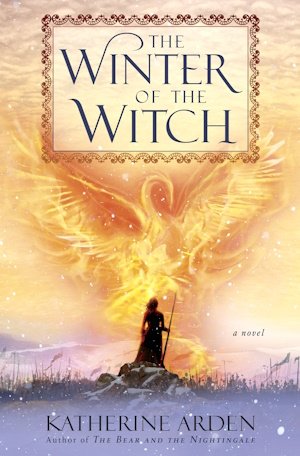“Thank you,” Vasya said to the golden mare. “More than I can say.”
Pozhar flicked an ear, spun, and trotted off without another word.
Vasya watched the mare go, a little forlorn, trying, yet again, not to think of Solovey. The campfire by the river glimmered bright in the darkness. “Traveling by midnight is all very well,” Vasya muttered.
“But it involves far too much creeping up on folk in the dark. Who do you suppose that is?”
“I have no notion,” said Morozko shortly. “I can’t see.” He said it matter-of-factly, but he looked shaken. In winter, his senses stretched far.
They crept nearer, and halted outside the firelight. A gray mare stood without hobbles on the other side of the flames. She raised her head uneasily, listening to the night.
Vasya knew her. “Tuman,” she breathed, and then she saw three men camped beyond the mare, sleeping rough. Three fine horses and a pack-horse. One of the men was just a dark bundle wrapped in a cloak. But the others were sitting upright beside the fire, talking, despite the late hour. One was her brother, his face thinned with days of travel, raw with sunburn. There were threads of white in his hair. The other was the holiest man in Rus’, Sergei Radonezhsky.
Sasha’s head came up, seeing the horses restless. “Something in the wood,” he said.
Vasya didn’t know how a monk—even her brother—would react to her just then, drenched as she was in magic and darkness, hand-fast

with a frost-demon. But she nerved herself and stepped forward.
Sasha wrenched round, and Sergei rose to his feet, spry despite his years. The third man jerked upright, blinking. Vasya recognized him: Rodion Oslyabya, a brother of the Trinity Lavra.
Three monks, dirty from days on the road, camping in a clearing in the summer night. Painfully ordinary; they made the winter midnights at her back feel like a dream.
But it wasn’t. She had brought the two worlds together.
She didn’t know what would happen.
THE FIRST BROTHER ALEKSANDR saw of his sister was a slim figure with a bruised face. He blasphemed in his mind; he sheathed his sword, offered up prayers, and ran to her.
She was so thin. Every plane of her face was blade-sharp: a skull picked out with firelight. But she returned his embrace with strength, and when he looked at her he saw her lashes wet.
Perhaps he was weeping, too. “Marya said you were alive. I—Vasya
—I am sorry. Forgive me. I wanted to go find you. I—Varvara said you had gone beyond our reckoning, that you—”
She cut into this flow of words. “There is nothing to forgive.”
“The fire.”
Her face hardened. “It is over, brother. Both fires.”
“Where have you been? What happened to your face?”
She touched the scar across her cheekbone. “This is from the night the mob came for me in Moscow.”
Sasha bit his lip. Father Sergei broke in, his voice sharp. “There is a white horse there in the wood. And a—shadow.”
Sasha spun, his hand again going to the hilt of his sword. In the darkness, just touched by the edges of the firelight, stood a mare, white as the moon on a winter night.

“Yours?” Sasha said to his sister, and then he looked again. Beside the mare, the shadow was watching them.
Again, he put a hand to his sword-hilt.
“No,” said his sister. “You don’t need it, Sasha.”
The shadow, Sasha realized, was a man. A man whose eyes were two points of light, colorless as water. Not a man. A monster.
He drew his sword. “Who are you?”
MOROZKO MADE NO ANSWER, but Vasya could feel the anger in him. He and the monks were natural enemies.
Catching her brother’s eye, she saw with an unpleasant feeling that Sasha’s fury wasn’t just the impersonal disdain of a monk for a devil.
“Vasya, do you know this—creature?”
Vasya opened her mouth, but Morozko stepped into the light and spoke first. “I marked her from her childhood,” he said coolly. “Took her into my own house, bound her to me with ancient magic, and put her on the road to Moscow.”
Vasya glared wordlessly at Morozko. Her brother’s disdain was obviously not one-sided. Of all the things he might have said to Sasha first.
“Vasya,” Sasha said. “Whatever he has done to you—”
Vasya cut him off. “It doesn’t matter. I have ridden across Rus’
dressed as a boy; I have walked alone into darkness and come out alive. It is too late for your scruples. Now—”

























